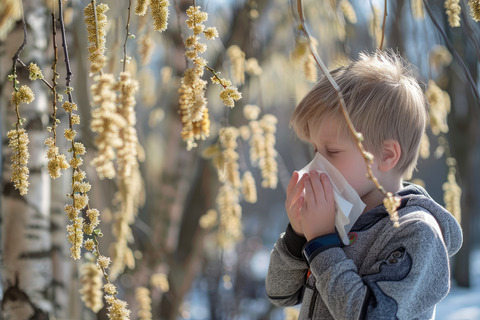New study reveals crucial differences in gene activity and opens up personalized therapeutic approaches
Krems (Austria), 15. January 2025 – An innovative study by the Karl Landsteiner University of Health Sciences (KL Krems) and the Medical University of Vienna (MedUni Vienna) provides new insights into the genetic mechanisms of birch pollen allergy. The research team observed significantly more active genes for immunological signalling pathways in the nasal mucosa of allergy sufferers after exposure to birch pollen than in unaffected individuals. The results of the study published in the renowned journal Allergy open up new possibilities for prevention and personalized therapies.
Birch pollen allergy is one of the most common allergies in Europe and affects around 450,000 people in Austria alone. It considerably impairs the quality of life and can lead to chronic diseases such as asthma in the long term. Despite this significance, little was previously known about the activity of genes that are directly linked to allergic reactions in the nasal mucosa. A new study by KL Krems, MedUni Vienna and other partners now shows for the first time significant differences in gene activity in the nasal mucosa between those affected and those not affected.
Insights Into Cellular Reactions
The research focussed in particular on the transcriptome profiles (gene expression patterns) of the nasal mucosa when exposed to birch pollen. „Our analyses show that significantly more genes are activated in allergy sufferers than in those who are not affected,“ explains study leader Priv.-Doz. Dr. Christine Hafner, from the Division of Dermatology and Venerology at the St. Pölten University Hospital, a teaching and research location of KL Krems. „The activation of numerous genes associated with inflammation and immune defence was particularly striking. The results of the study open up new approaches for personalized therapies and the development of innovative preventive measures to better protect those affected.“
In detail, the study showed that 160 genes in the nasal mucosa significantly changed their activity after exposure to birch pollen in allergy sufferers, while this was only the case for 44 genes in non-affected individuals. Above all, immunological signalling pathways such as granulocyte chemotaxis and IL-8 signalling pathways were activated, but also mechanisms of wound healing and cell migration. In fact, these changes occurred just a few minutes after provocation, whereas they were not detectable in unaffected individuals.
„We also found significantly higher concentrations of specific pro-inflammatory molecules such as CCL17, IL-16 and IL-33 in allergy sufferers,“ explains Univ.-Prof. Dr. Heimo Breiteneder from the Institute of Pathophysiology and Allergy Research at MedUni Vienna’s Center for Pathophysiology, Infectiology and Immunology. „These molecules could play key roles in allergic reactions and serve as a starting point for new therapies.“ The cooperation partners, which also include MedUni Vienna’s Department of Otorhinolaryngology, also discovered that the nasal mucosa has stronger barrier functions in unaffected people, including increased production of proteins that promote the stability of the mucosa.
The study was conducted as part of the ‘Danube-ARC – Danube Allergy Research Cluster’ project funded by the state of Lower Austria. In addition to KL Krems, MedUni Vienna, the University of Natural Resources and Life Sciences Vienna, the University of Veterinary Medicine Vienna, the Austrian Institute of Technology and the University Hospitals of St. Pölten and Krems are also involved in this cluster. The cluster is headed by Prof. Dr Rudolf Valenta from MedUni Vienna’s Institute of Pathophysiology and Allergy Research.
Original Publication: Transcriptomic Profiles of the Nasal Mucosa Following Birch Pollen Provocation Differ Between Birch Pollen-Allergic and Non-Allergic Individuals. S. Sudharson, J. Eckl-Dorna, A. Meshcheryakova, J. Basilio, S. Derdak, T. Kalic, N. Lengger, N. Schweitzer, D. Mechtcheriakova, H. Breiteneder & C. Hafner. Allergy, 2024; 0:1–13. https://kris.kl.ac.at/en/publications/transcriptomic-profiles-of-the-nasal-mucosa-following-birch-polle
doi: 10.1111/all.16448
Karl Landsteiner University of Health Sciences (01/2025)
The Karl Landsteiner University of Health Sciences (KL Krems) is an educational and research institution on the Campus Krems and recognised throughout Europe. KL Krems offers modern, demand-oriented education and continuing education in medicine and psychology as well as a PhD programme in Mental Health and Neuroscience. The flexible educational programme is tailored to the needs of students, the requirements of the labour market and the challenges of science. The three university hospitals in Krems, St. Pölten and Tulln and the MedAustron Ion Therapy and Research Centre in Wiener Neustadt guarantee clinical teaching and research of the highest quality. In its research, KL Krems focuses on interdisciplinary fields with high relevance to health policy – including biomechanics, molecular oncology, mental health and neuroscience as well as the topic of water quality and the associated health aspects. KL Krems was founded in 2013 and accredited by the Austrian Agency for Quality Assurance and Accreditation (AQ Austria).
Scientific Contact
Priv.-Doz. Dr. Christine Hafner
Division of Dermatology and Venereology
University Hospital St. Pölten
Karl Landsteiner University of Health Sciences
Dunantplatz 1
3100 St. Pölten / Austria
W https://www.kl.ac.at/
Karl Landsteiner University of Health Sciences
Mag. Selma Vrazalica, BA
Communication, PR & Marketing
Dr.-Karl-Dorrek-Straße 30
3500 Krems / Austria
T +43 2732 72090 237
M +43 664 883 99 603
Copy Editing & Distribution
PR&D – Public Relations for Research & Education
Dr. Barbara Bauder-Jelitto
Kollersteig 68
3400 Klosterneuburg / Austria
M +43 664 1576 350
E bauder@prd.at
L https://www.linkedin.com/company/prd-public-relations-für-forschung-bildung

